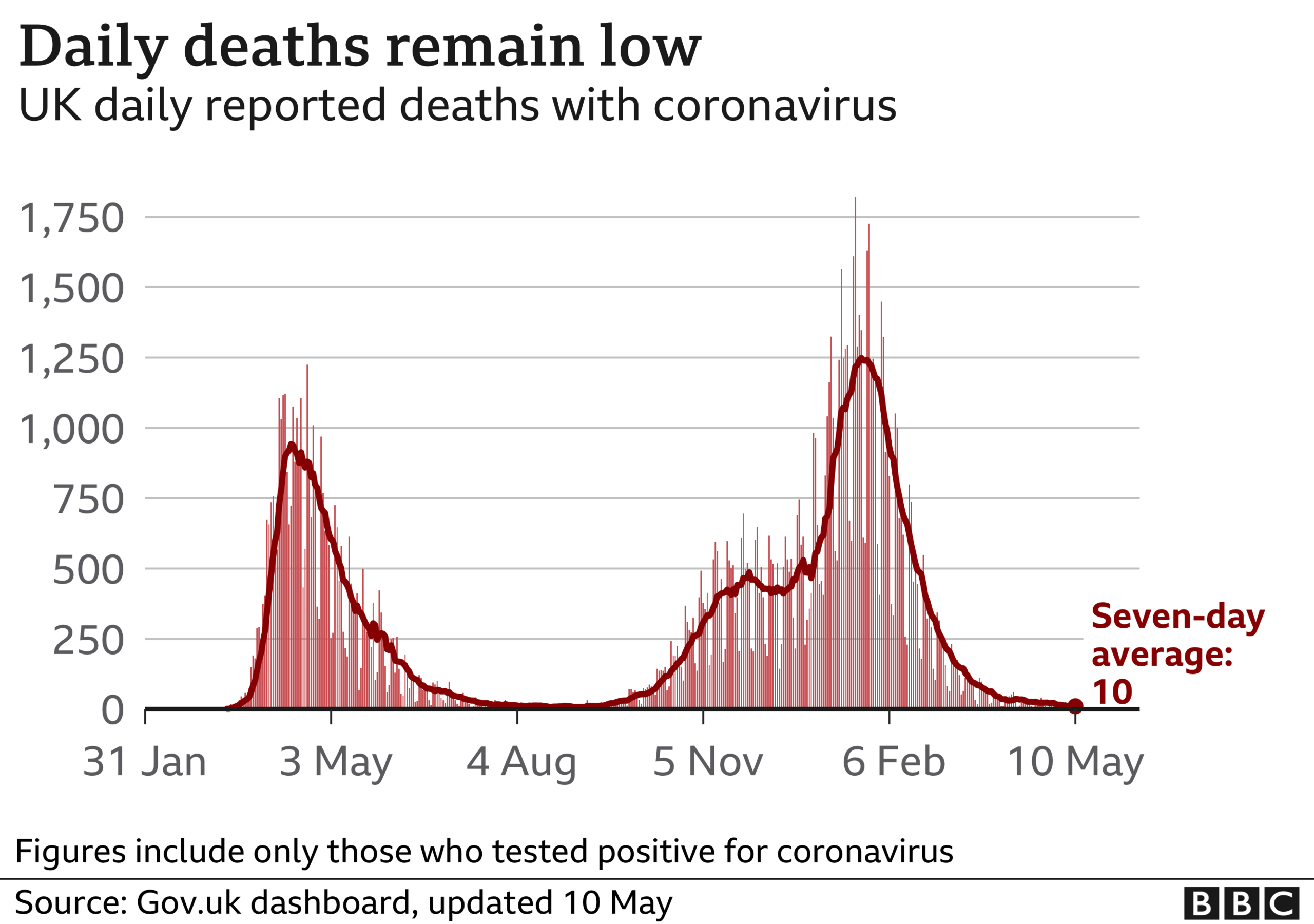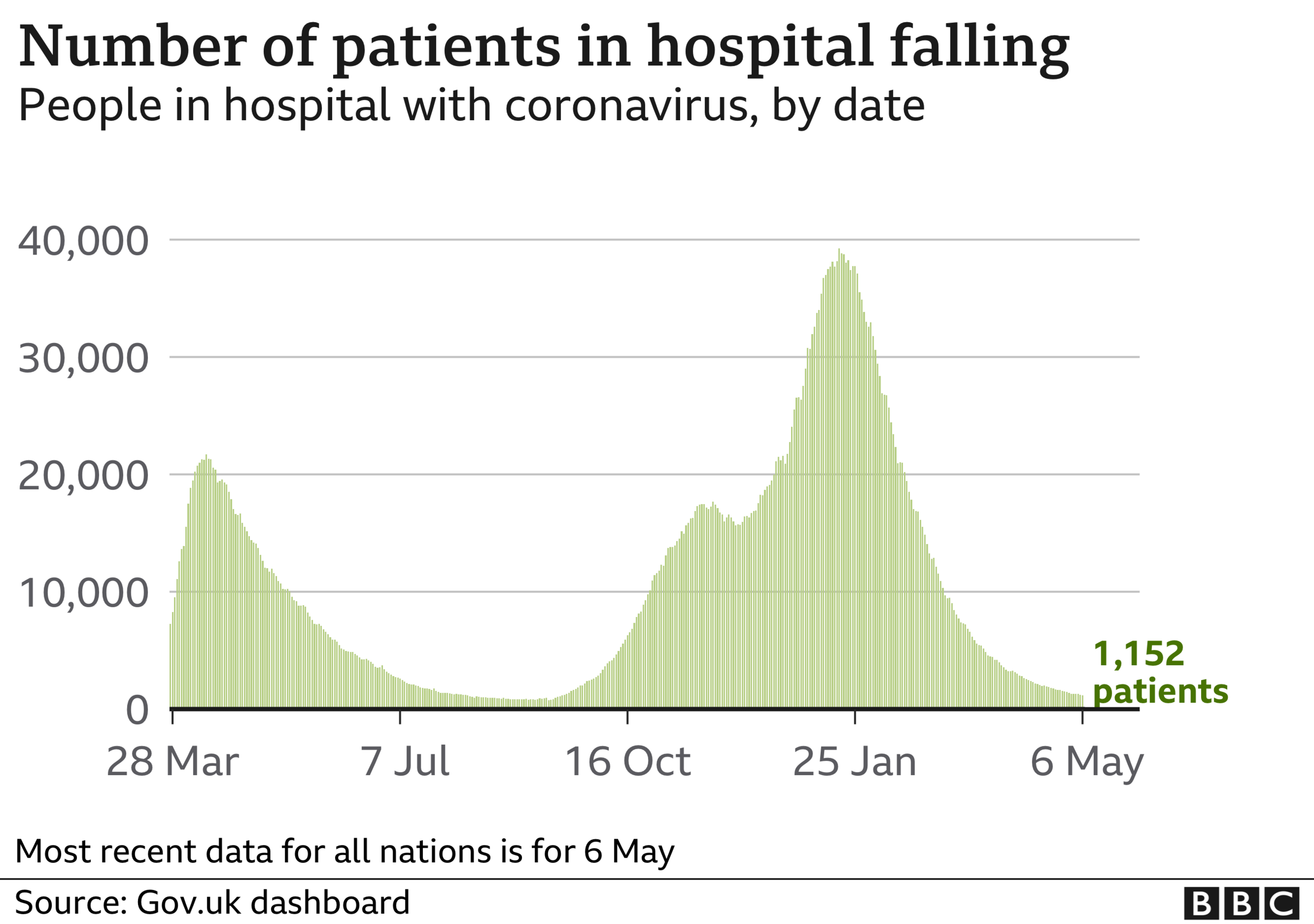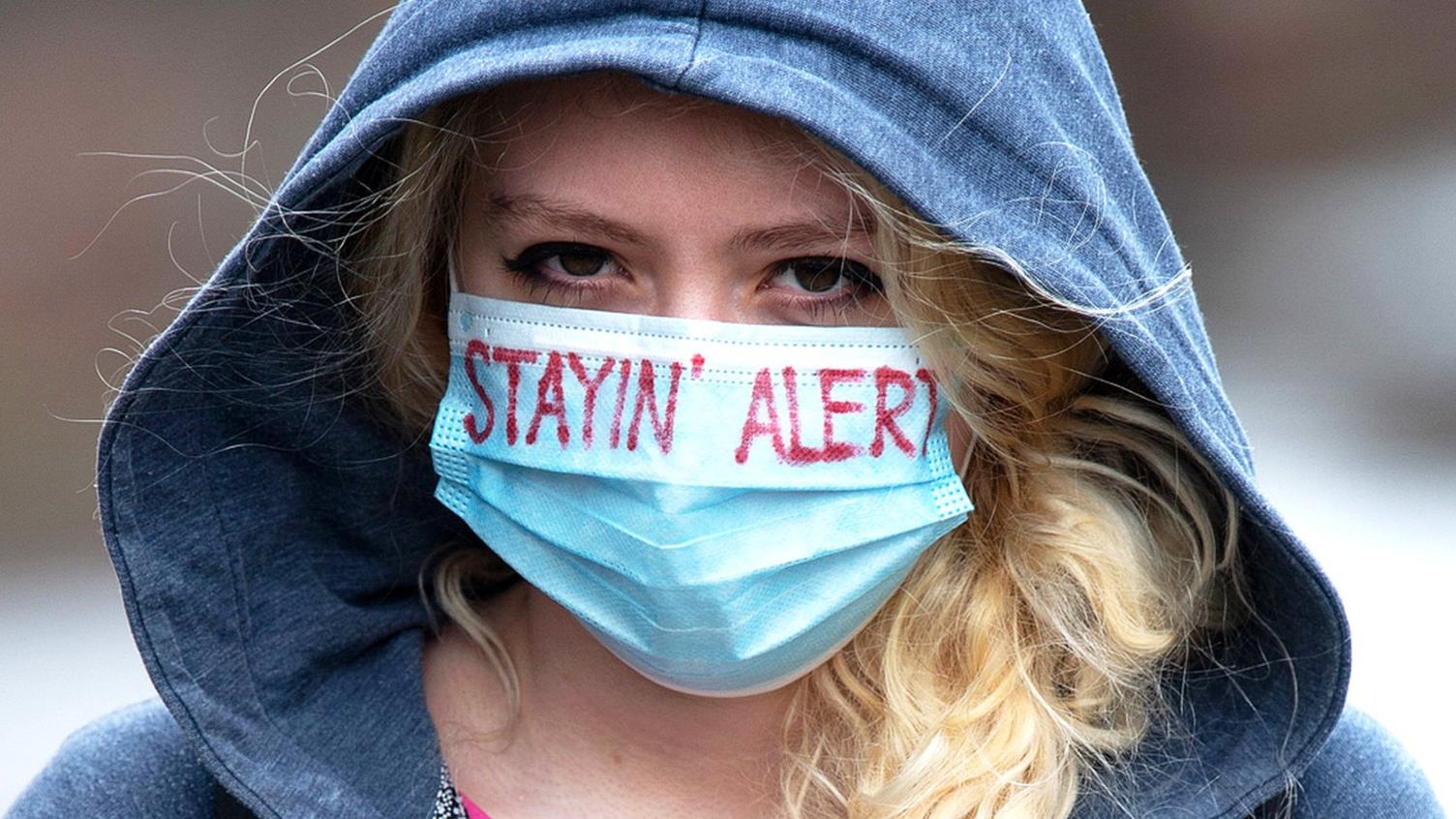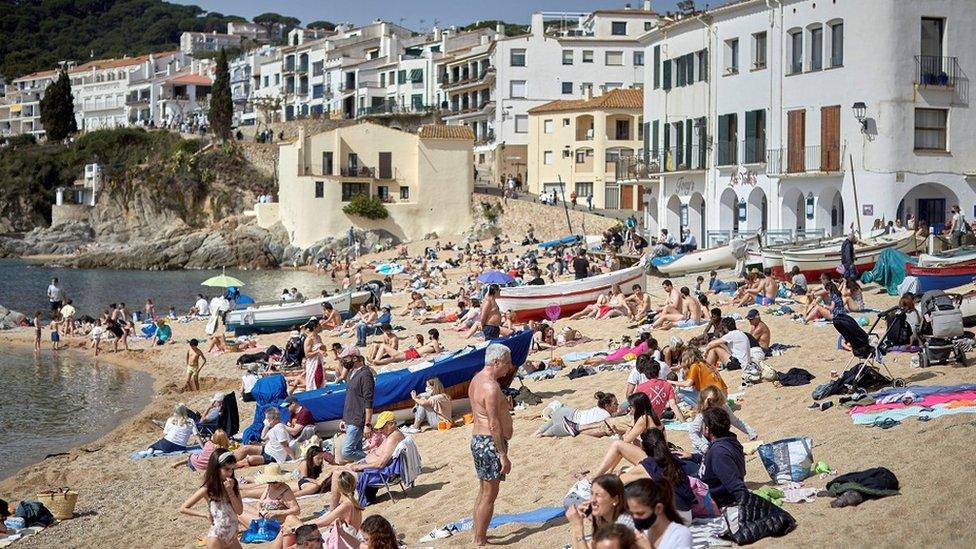Coronavirus: Hugs with loved ones as PM confirms England's biggest step back to normal
- Published
PM Boris Johnson warns the public not to "throw caution to the wind"
People in England will be allowed to hug loved ones and enjoy indoor hospitality from next Monday, the PM has said - whilst urging people to "exercise caution and common sense".
Boris Johnson said this was the "single biggest step" to unlocking society but that people should remain vigilant.
Indoor mixing and overnight stays in groups of up to six people or two households will also resume.
Leisure venues such as cinemas, museums and children's play areas will reopen.
Speaking at a Downing Street news conference, Mr Johnson said the further relaxation of England's lockdown would go ahead on 17 May as the government had met its four tests for easing restrictions.
These tests relied on the success of the vaccine rollout, evidence that the jabs were reducing serious illness and death, infection rates remaining under control and the risks from new Covid variants not changing.

What is changing in England on 17 May?
People can meet in groups of up to 30 outdoors
Six people or two households can meet indoors
Overnight stays will be allowed in groups of up to six people or two households
Pubs, restaurants and other hospitality venues can reopen indoors
Adult indoor group sports and exercise classes can restart
Indoor entertainment such as museums, theatres, cinemas, bingo halls, sports stadia and children's play areas can reopen
Performances and large events can restart, with limits on audience numbers
Remaining outdoor entertainment, such as outdoor theatres and cinemas can open
Hotels, hostels and B&Bs can reopen
Holidays abroad to green list countries will be allowed
Up to 30 people can attend weddings (although dancing will still not be allowed) and more than 30 can attend funerals

The prime minister said the latest data showed deaths and hospitalisations had dropped to their lowest level since last July.
Zero coronavirus deaths were announced in England, Scotland and Northern Ireland on Monday, while Wales recorded four deaths.
More than two-thirds of adults across the UK have now received a coronavirus vaccine, with almost 18 million people having had their second dose.
The UK's four chief medical officers said earlier that the UK's Covid alert level should be lowered from level four to three.
It means that although coronavirus is in general circulation, transmission is no longer high or rising exponentially, so restrictions can be gradually reduced.
Mr Johnson said that all the data supported the latest easing of restrictions, which he said amounted to "a considerable step on the road back to normality".
"And today we're taking a step toward that moment when we learn to live responsibly with Covid, when we cease eventually to rely on detailed government edicts and make our own decisions based on the best scientific advice about how best to protect our families and those around us."
He added that, as part of the latest lockdown easing, the government would update its guidance on close contact between close family and friends shortly.
The advice would explain the risks involved so people could make informed choices, he said.
"This doesn't mean that we can suddenly throw caution to the winds. We all know that close contacts such as hugging is a direct way of transmitting this disease," he said.
"So I urge you to think about the vulnerability of your loved ones."
Mr Johnson said social distancing should still be followed when people are not with their friends and family in workplaces, shops, pubs, restaurants and other settings.

LOOK-UP TOOL: How many cases in your area?
LOCKDOWN RULES: What are they and when will they end?
OXFORD JAB: What is the Oxford-AstraZeneca vaccine?

He also confirmed that the wearing of face masks in secondary school classrooms in England will not be required after 17 May.
Care home residents will be able to have up to five named visitors, he said, and greater freedoms to enjoy low- risk visits outside their home without having to isolate on their return.


This next unlocking is - as the prime minister and his scientists stressed - the most significant step yet.
Indoors is, after all, where transmission is most likely to take place, which explains why quite a sober tone accompanied the confirmation that restrictions would lift.
It means vaccines are going to have to do most of the work in terms of controlling infection levels - during the winter it has been lockdown and social distancing that has played a key role in getting cases down.
The good news is that all the evidence is pointing to the vaccines being incredibly effective.
It means the threat of the NHS being overwhelmed and lockdowns reimposed has gone - unless a new variant comes along that can evade the vaccines in a significant way (considered unlikely by most experts).
But cases could still creep up and there could be local outbreaks that need intervening on.
It's why the key message is proceed with caution.

The devolved nations are working to their own timeframe for easing restrictions.
Under current plans in Wales, indoor attractions, cinemas and theatres will open alongside pubs and restaurants serving customers inside on 17 May.
In Scotland, indoor hospitality venues are expected to resume with alcohol being served until 22:30. Cinemas, amusement arcades and bingo halls should reopen and indoor group exercise restart.
More restrictions might be lifted in Northern Ireland on 24 May, including the reopening of indoor hospitality, B&Bs and hotels.


The prime minister said subject to the impact of the latest easing on the data, England was still on track to progress to step four of the government's roadmap from 21 June - when it is hoped that all legal limits on social contact will be removed.
Asked by BBC Health editor Hugh Pym if the final stage of unlocking would be brought forward, Mr Johnson said every time restrictions are relaxed, "we give ourselves breathing space" to make sure that cases are not rising too much due to more social contact being allowed.
The easing of measures next week is the most significant step, he added, saying that businesses want to get ready for the next planned relaxation on 21 June with the "biggest certainty" they can have.
In order to give businesses time to prepare, further details will be released later this month "about what the world will look like and what role there could be, if any, for certification and social distancing", Mr Johnson said.
Meanwhile, new data published by Public Health England shows that a single dose of the Oxford-AstraZeneca Covid jab reduces the risk of death with Covid by 80% compared with unvaccinated individuals.
Researchers also found the two doses of the Pfizer-BioNtech vaccine reduced the risk of death by 97%.
In other key developments:
Surge Covid testing is taking place in a fourth London council area- the Royal Borough of Kensington and Chelsea - after cases of the South African variant were found in Notting Hill. Surge testing is also set to start in Nottingham for two weeks after a rise in cases of the Indian variant
People in Scotland will be able to travel to some foreign destinations without the need to quarantine on their return under a traffic lights system due to come into force on 24 May, the BBC understands

FRESH STARTS: Follow extraordinary people who set out on courageous new beginnings
THE MAN WHO COULD HAVE BEEN A PRINCE: Keith found out the surprising truth about his birth parents


Is there someone you have been waiting until the guidance changes to hug? Who are you most looking forward to hugging and why? Share your stories by emailing haveyoursay@bbc.co.uk, external.
Please include a contact number if you are willing to speak to a BBC journalist. You can also get in touch in the following ways:
WhatsApp: +44 7756 165803
Tweet: @BBC_HaveYourSay, external
Please read our terms & conditions and privacy policy
If you are reading this page and can't see the form you will need to visit the mobile version of the BBC website to submit your question or comment or you can email us at HaveYourSay@bbc.co.uk, external. Please include your name, age and location with any submission.
- Published10 May 2021

- Published10 May 2021

- Published10 May 2021
